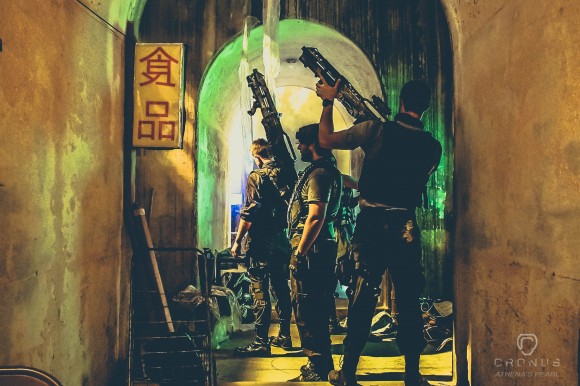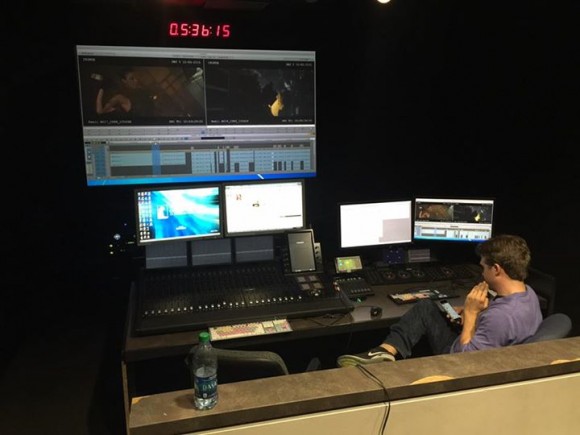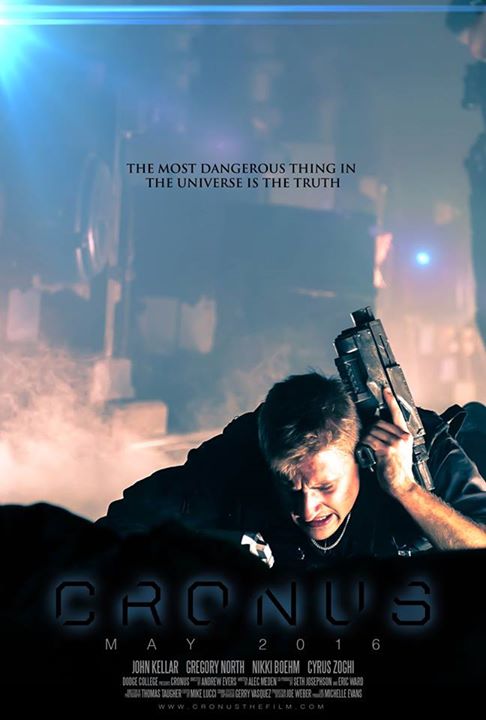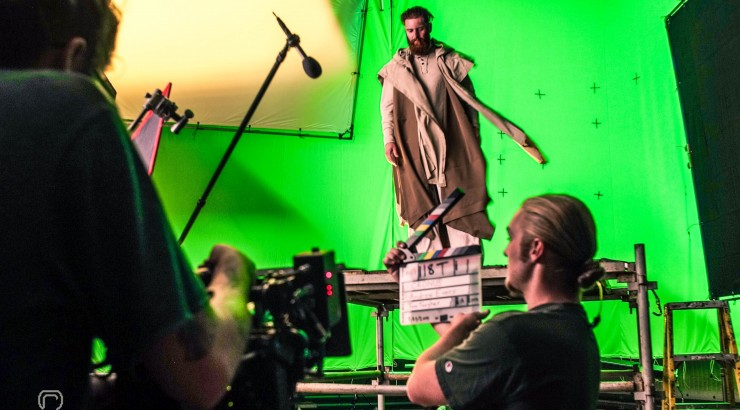CRONUS is Pushing Boundaries of Student Films
December 2, 2015
When you think of epic, sprawling space films about intergalactic wars, one tends to imagine a massive, multi-million dollar price tag to go along with it. However, some students here at Dodge are doing their own take on this type of film, making it look like what you’d see on the big screen, but for a fraction of the cost.
That film is
Cronus
, about Sam Vermeer, who has always wanted to be like his dad, famed admiral Janek Vermeer. But once Sam loses his rank as a space-fighter pilot, and heads down a dark path, he comes face to face to something he was not prepared for: the truth.
The idea for the story came from director Andrew Evers (BFA/Film Production ’16), who wanted to come up with something fitting for a dystopian future. He came up with the initial concept about three years ago, when it was just about a space pilot fighting in the future, and it evolved over the years. Evers was heavily influenced by many different science fiction stories, such as Battlestar Galactica and Halo. He loved the world building aspect of it, and wanted to keep the human aspect of the future, but with a grittier, science fiction feel.
“Everything is real and dangerous here,” said Evers. “Life in space is difficult…especially with political conflicts.” He compiled a lot of visual references over the years, so it was easy to bring it to others to show what he was going for.

And that’s exactly what happened when Evers got together with producer Seth Josephson (BFA/Creative Producing ’16). With Josephson on board, they brought it to Alec Meden (BA/Screenwriting ’17) to write it. Once they had it down on paper, they were able to pitch it to the Women of Chapman, who issued them a grant to help with their budget. It was then that another producer, Eric Ward (BFA/Creative Producing ’16), came on board to help with the project.
“Because it was such a big and ambitious project, it was helpful to have two producers,” said Ward. “Seth and I mixed and match duties, and filled in the gaps when stuff had to be done. It was overwhelming at first, because there were so many moving parts, but this is what I came to film school for. Why
wouldn’t
I want to be a part of a project like this?”
One of the things they aimed to accomplish was to replicate high-end, big budget techniques used in Hollywood filmmaking on the student level. For that, they made sure to use the facilities that are offered here at Dodge College. They spent a weekend on the sound stages here, shooting on practical sets and using the green screen, to achieve the scenes set on the spaceship. Their sets, and the extensions that will be added in post-production, were all designed by Joe Weber (BFA/Film Production ’16).
“Though we were working in a smaller space, with the green screen’s help, we’ll be able to show the size and scale of the world itself,” said Evers. “There will be plenty of background elements, and while not the focal point of the scene, it will show that the ship is alive.”
In addition to their virtual sets, they also shot on-location for another weekend, in places such as a Waste Treatment Plant. The aesthetic of the location fit perfectly with what they were going for, and though they had to get special permission to shoot there, it worked out quite nicely for the film itself.
What made the shoot much easier is that they had a cast and crew that wanted to be there. The idea of working on a science fiction film excited everyone, and kept them motivated throughout the shoot.

“We created something that we were passionate about, and that enthusiasm carried over to the cast and crew as well,” said Evers. One of those enthusiastic crew members was cinematographer Tom Taugher (BFA/Film Production ’16). He had wanted to do a science fiction film for some time, and they were happy to set him loose on the production. At times when they didn’t have the resources they needed to do certain things, Taugher got creative, and added his own unique flair to it.
On top of the massive scale of the film itself, they added even more complications for themselves by adding integrated stunts and ambitious sequences. However, the team didn’t shy away from the challenge.
“We were willing to take things on, even if they were difficult,” said Ward. “In the end, that helped draw a lot of people to the production to help us out.” And he’s not lying there; many professionals in the industry, such as stunt coordinators and mentors, came on board because project was so ambitious.
“We had a lot of meetings and consulted lot of professionals to get advice. They got very invested in the project. They came to help and wound up becoming part of the family,” said Ward.
When asked what they found most challenging about the process, everyone responded with a resounding “What
wasn’t
a challenge?”
“But we built a strong foundation with our team. They were the most important thing. We, together, overcame all the issues we faced,” said Evers.
“There was a lot of a lot of transparency between departments, and lots of communication. Laying that ground work in the beginning helped with success,” said Ward.
Right now, the team is deep in the editorial and post production process. Since they were the first film to finish their shooting schedule, they are also the first to test some of the new software the school has received this year.
“We’re using Shotgun, the industry standard for visual effects tracking,” said Evers. “I worked with it at my internship, so being familiar with it helps a lot. Especially when you have as many visual effects in a film as
Cronus
has.”

The team is thankful to Dodge for staying at the top of their game when it comes to industry standards, as well.
“The things we are using are things we will be using after we graduate. It helps a lot, and it helps us learn so we are prepared for later in life. And it’s great to bring other people into the production, so they can learn for their Dodge career, and their overall career as well,” said Ward.
The team has always been very active in sharing their progress on social media. They wanted to showcase how far they have come, and every step of the way.
“People have to know what the movie is in order to see it, especially with student films,” said Ward. “You need to sell it with powerful tools like social media.” The team has been very up to date sharing things on their
Facebook page
, showcasing behind the scenes content and more.
“It was also a good way to send it to our parents and say ‘this is what you’re paying for!’” Ward joked.
At the end of the day, all of them are extremely proud of the work they have done so far, and are continuing to do, on the film.
“I always thought why would I wait to make something I wanted to make?” Evers said. “You want to distinguish yourself from everything else. You get stereotyped on the content you produce, so you want to establish strong portfolio pieces right off the bat, in that genre you want to work on. That’s why I really wanted to do
Cronus
.”

“Students have limiting beliefs in what they can do in film school, and that they only have so much money,” said Ward. “But why not give it a shot? You never know. It’s always a no if you don’t ask.”
“The biggest lesson I learned, the best take away, is to push boundaries, and have fun. When people see that, they are not involved because you asked, but they are involved because of personal desire. Because they see how involved you are. Because they want to be.”
For more information, be sure to check out
the film’s website
.


